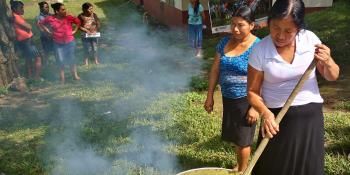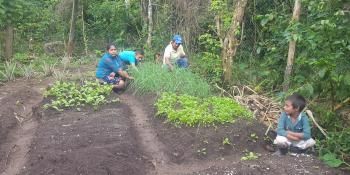The Republic of Guatemala is located in the tropical zone of Central America and covers an area of 108,890 km2. The phenomenon of poverty is more marked in rural areas and particularly in the highlands of the country, where the proportion of indigenous population is higher.
In 2011, agriculture generated more employment in the country than any other sector, accounting for 37.7% of the employed population. Agriculture's contribution to gross domestic product (GDP) is estimated at 13.3%. Of the area under cultivation, basic grains (corn, rice and beans) cover 41.9%, vegetables cover 4.3%, permanent crops such as coffee, rubber and palm oil cover 27.3%, semi-permanent crops such as sugar cane and pineapples cover 9.5%, and cultivated pastures cover 17%. It is notable that coffee provides 40% of the total value of exports from the agricultural sector, followed by bananas at 16.9%.
Over the last twnety years, Guatemala has been one of the ten countries most affected by extreme weather events. In 2010, it was ranked second in the world on the the Global Climate Risk Index, which indicates the level of exposure and vulnerability to extreme events.
The economic and social development of the country tends to be interrupted by earthquakes, volcanic eruptions, hurricanes, floods and forest fires. In 1998, Hurricane Mitch caused damage worth an estimated 4.7% of GDP and, in 2005, Hurricane Stan caused damage worth an estimated 3.4% of GDP. In 2011, it estimated that Tropical Depression Twelve-E caused damage and losses of more than USD 343 million, representing 0.4% of the country's expected GDP for the year. In 2012, 53,297 families suffered crop losses due to drought, amounting to a cost of 83,578.8 thousand Guatemalan Quetzales. Longer periods of rainfall scarcity are also occurring in the dry corridor, covering the departments of Quiché, Baja Verapaz, El Progreso, Guatemala, Zacapa, Chiquimula, Jalapa and Jutiapa.
Over the years, the development of agricultural activities in soils unsuitable for agriculture and unsustainable agricultural practiceshas increased the vulnerability of rural areas to climate change, affecting the food security of communities which, in turn, triggers social phenomena such as migration.


